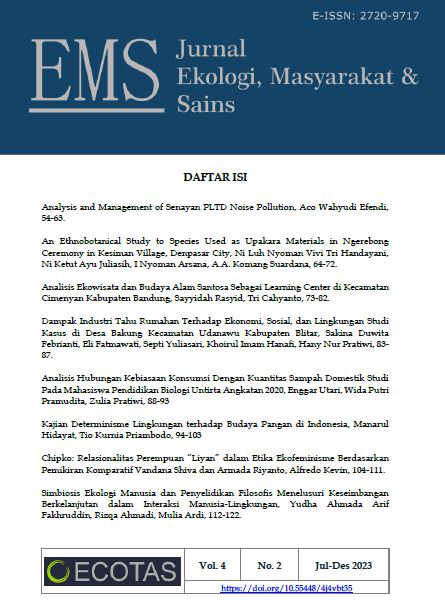Chipko: Women-“Other” Relationality in Ecofeminism Ethics based on the comparative thinking of Vandana Shiva and Armada Riyanto
DOI:
https://doi.org/10.55448/cnjs9m58Keywords:
Chipko, relationality, ecofeminismAbstract
Abstract: This research study pays attention to ecofeminism in the Chipko movement. The methodology used in this study is a comparative approach. An ecofeminist figure, Vandana Shiva has a perspective of an important relation between women and nature. Armada Riyanto calls nature as an other that must be treated as a subject as well as a society that must be respected, valued, and protected. As for nature as a metaphor for the essence of human life itself. The purpose of this study is that the Chipko movement is a symbol of local wisdom to use conscience in saving the existence of living things. The writer finds that nature provides an illustration of the existence of an important relationship between humans humans, nature and God. Armada refers to this dimension as the focus on transcendence. As a result, both Vandana Shiva’s and Armada Riyanto’s thoughts agree that conscience embodied in empathy plays an important role in efforts to care for and save the natural environment, as well as to stop paternalist thought that always dominate women, while women contain the concept of a mother who has love and great attention to their children, in this case is the forest.
References
Amirullah. 2015. “Krisis Ekologi: Problematika Sains Modern.” Jurnal Lentera XVIII (1): 1–21.
Astuti, Tri Marhaeni Pudji. 2012. “Ekofeminisme Dan Peran Perempuan Dalam Lingkungan.” Indonesian Journal of Conservation 1 (1): 49–60. http://journal.unnes.ac.id/nju/index.php/ijc/article/download/2064/2178.
Beauvoir, Simone de. 1984. The Second Sex. Harmondsworth: Penguin.
Bernadus Wibowo Suliantoro & Caritas Woro Murdiati. 2019. Perjuangan Perempuan Mencari Keadilan & Menyelamatkan Lingkungan; Telaah Kritis Etika Ekofeminis Vandana Shiva. Cahaya Atma Pustaka. Yogyakarta. http://e-journal.uajy.ac.id/20723/6/buku Perjuangan Perempuan.pdf.
Darmawati, Intan. 2002. “Dengarlah Tangisan Ibu Bumi! Sebuah Kritik Ekofeminisme Atas Revolusi Hijau.” Jurnal Perempuan 1 (21): 7–24.
Driyarkara. 2006. Karya Lengkap Driyarkara. Jakarta: PT Gramedia Pustaka dan Kanisius.
Khotimah. 2008. Perempuan Dan Pembangunan Lingkungan. Jakarta: Rahima Jakarta.
Mardimin, J. 1994. Jangan Tangisi Tradisi. Yogyakarta: Kanisius.
Murtijo. 2007. Konflik Pengusahaan Hutan: Potret Pengelolaan Hutan Di Indonesia. Jakarta: Wana Aksara.
Pambudi, Priyaji Agung, Suyud Warno Utomo, Soemarno Witoro Soelarno, and Noverita Dian Takarina. 2022. “Etika Tanah Aldo Leopold: Telaah Moral Atas Eksploitasi Dan Kewajiban Reklamasi Tambang Batu Bara.” Jurnal Ekologi, Masyarakat Dan Sains 3 (2): 37–44. doi:10.55448/ems.v3i2.56.
Ricoeur, Paul. 2006. Hermeunetika Ilmu Sosial. Yogyakarta: Kreasi Wacana.
Riyanto, Armada. 2013. Menjadi-Mencintai; Berfilsafat Teologis Sehari-Hari. Yogyakarta: PT Kanisius.
Riyanto, Armada. 2018. Relasionalitas; Filsafat Fondasi Interpretasi: Aku, Teks, Liyan, Fenomen. Yogyakarta: Kanisius.
Shiva, Vandana. 1988. Staying Allive Women, Ecology and Survival in India. New Delhi: Kali For Women N 84 Panchila Park.
Shiva, Vandana. 1997. Bebas Dari Pembangunan Perempuan, Ekologi Dan Perjuangan Hidup Di India. Jakarta: Yayasan OBOR.
Shiva, Vandana. 2005. Earth Democracy Justice, Sustainability, and Peace. London: North America by South End Press.
Vandana Shiva & M.Mies. 2005. Ecofeminisme: Perspektif Gerakan Perempuan Dan Lingkungan. Yogyakarta: IRE Press.
Yola, Erica. 2019. “Sifat Dan Perempuan-Perspektif Eco-Feministis.” Jurnal Papatung 2 (1): 109–119.
Downloads
Published
Issue
Section
License
Copyright (c) 2023 Jurnal Ekologi, Masyarakat dan Sains

This work is licensed under a Creative Commons Attribution-NonCommercial 4.0 International License.
Authors of articles published in Jurnal EMS are permitted to self-archive the published/PDF version anywhere.





























